News
Lookwell CEO Kayongo shares key takeaways from 'successful' COP30
"COP30 was largely a success, both in terms of global climate diplomacy and in accelerating practical pathways for climate finance, technology deployment, and country-level implementation."
A combo of pictures showing Lookwell Investments Ltd CEO Paul Mark Kayongo posing for a photo at the venue of COP30 in Belem, Brazil. (Courtesy photo)
By: Admin ., Journalists @New Vision
__________________________
📝 Q&A
The 2025 United Nations Climate Change Conference (COP30 summit) in the Amazonian city of Belem concluded at the end of last week after a fortnight of meetings in the Amazonian city of Belem. A voluntary plan to curb fossil fuels, a goal to triple adaptation finance and new efforts to strengthen climate targets were launched at the summit in Brazil.
Billed as a COP of “truth” and “implementation”, the event – which took place 10 years on from the Paris Agreement – was seen as a moment to showcase international co-operation.
COP30 president Andre Correa do Lago pledged to create voluntary "roadmaps" to move the world away from fossil fuels and halt deforestation after a climate deal without such measures was approved at the UN talks.
Nearly 200 countries and over 500 companies attended the two-week summit. Among the companies was Lookwell Investments Ltd, whose work revolves around clean energy, waste management, smart infrastructure, as well as policy, research and advocacy. CEO Paul Mark Kayongo (pictured below) led the company's delegation in Belem and now shares his experience from the summit:
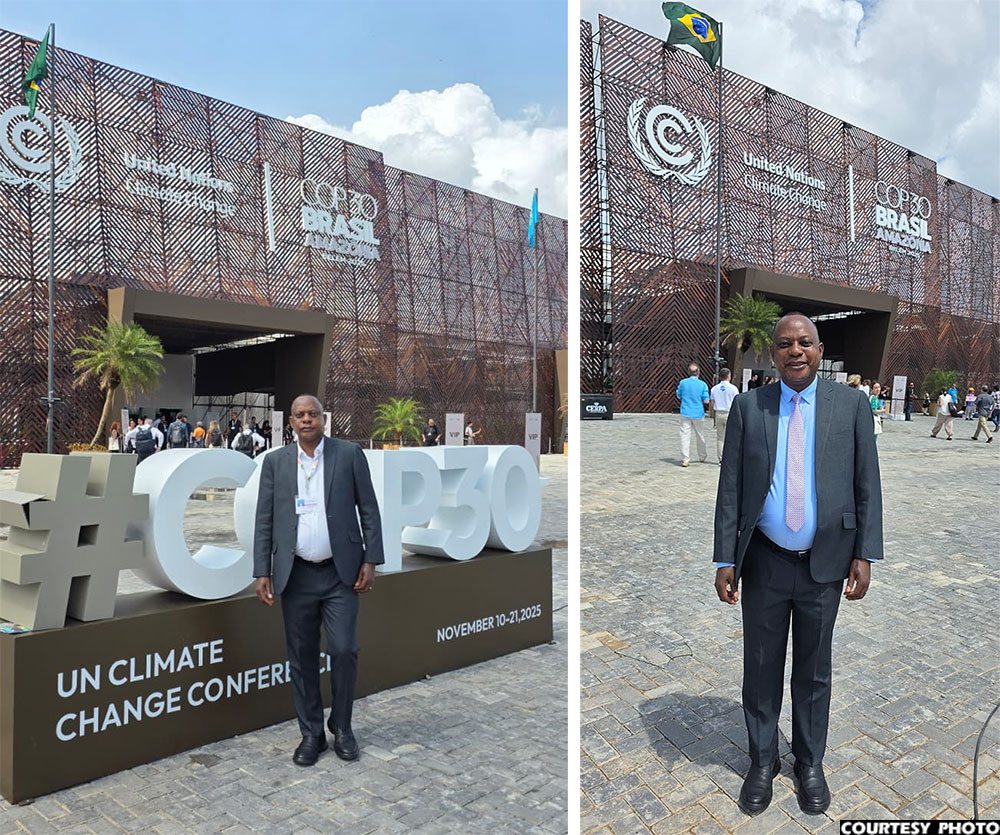
Dr Paul Mark Kayongo, the CEO of Lookwell Investments Ltd, poses at the venue of COP30 in Belem, Brazil
_________________________
Q: From your observation, was COP30 a success?
A: Yes — COP30 was largely a success, both in terms of global climate diplomacy and in accelerating practical pathways for climate finance, technology deployment, and country-level implementation.
For the DRC delegation specifically, it provided an unprecedented platform to position the country as a climate powerhouse and a global carbon-sink nation, while attracting attention to innovative private-sector solutions such as our own CleanBreeze Biogas Solutions.
The summit succeeded in advancing discussions on a new global climate finance architecture and strengthening commitments for methane reduction. There were also engagements on elevating the role of the Amazon–Congo rainforest basins in global climate stability, as well as emphasizing circular-economy, waste-to-energy, and nature-based solutions as critical pillars of climate action.
Overall, COP30 advanced momentum toward implementing real, measurable climate action in developing countries.
▪️ 'DRC can lead Africa's path to smart, sustainable climate solutions'
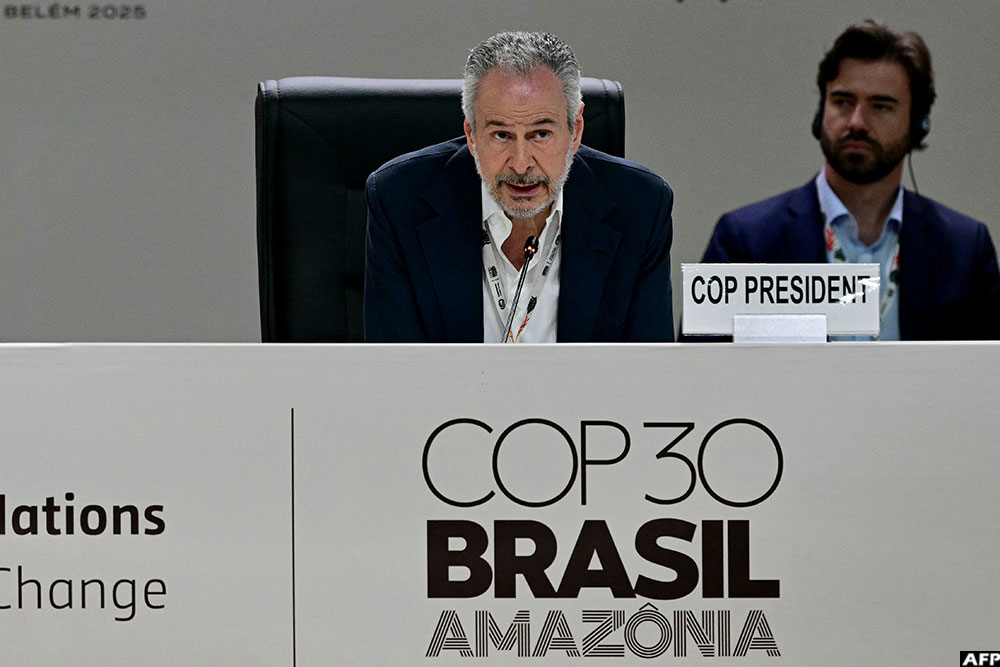
Q: You were fortunate to make a presentation at the summit. How was your Biogas Solutions message received by delegations from around the world and the DR Congo?
A: Our presentation, “Sustainable ways of managing climate change through waste management to generate renewable energy,” was extremely well-received.
Delegations responded strongly to the following three aspects:
a) The innovation of the CleanBreeze model. We demonstrated how converting organic waste into biogas electricity, clean cooking gas, and organic fertilizer can simultaneously address three national crises in the DRC: unmanaged waste, dependence on biomass, and declining agricultural productivity.
b) Alignment with NDCs, SDGs, and methane-reduction goals. Many high-level officials appreciated that our solution directly contributes to lowering methane emissions, a major global priority at this COP.
c) DRC leadership and government endorsement. Representatives from the DRC Ministry of Environment signaled strong interest in working with private-sector actors like Lookwell to implement scalable waste-to-energy infrastructure.
We also received invitations for follow-up technical conversations from partners in Brazil, the EU, and African delegations, who saw our model as replicable across African cities.

DR Congo sent a delegation to the ongoing COP30 in Belem
Q: The world’s poorest nations have long complained they lack the finance to protect their economies from the impacts of climate change. Was this addressed?
A: Partially — but with important progress. At COP30, the conversation finally shifted from pledges to implementation and funding mechanisms. Key developments included:
• New commitments toward the Loss and Damage Fund, aimed at helping vulnerable countries recover from climate impacts.
• Brazil’s proposed global investment vehicle for forest protection, signaling a shift toward performance-based climate finance.
• Broader discussions on restructuring global finance systems to support climate-vulnerable nations.
However, many developing countries, including the DRC, still stressed that actual disbursements remain slow, and climate finance remains far below the scale needed.
So, while progress was made, the issue is not fully resolved, but COP30 marked meaningful movement in the right direction.
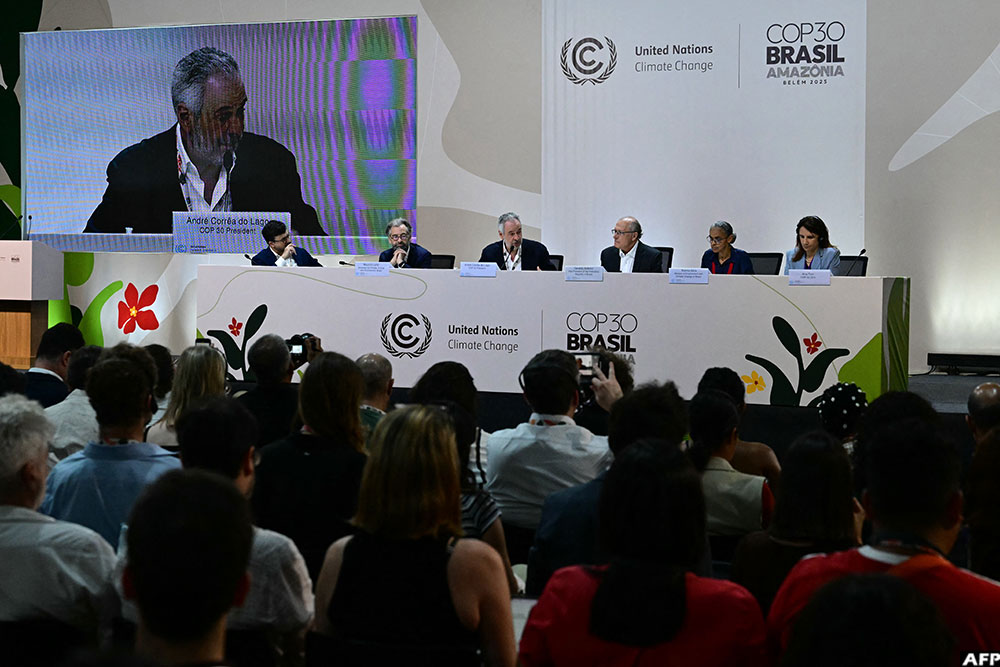
Q: At COP30, Brazil launched a new global investment vehicle that proposes paying out a share of profits to forest-rich countries for every hectare of trees they leave standing. How can African countries like DR Congo benefit from this?
A: The DRC stands to be one of the biggest beneficiaries globally. Here's how:
a) Monetizing standing forests. With over 154 million hectares of rainforest, the DRC is the second-largest forest reserve in the world. Under Brazil’s profit-sharing model, the DRC can earn payments for avoided deforestation, forest protection, and community conservation.
b) Blended finance for green infrastructure. Funds can be channeled into projects like waste-to-energy, biogas and clean cooking, sustainable agriculture, forest management, and climate-resilient communities
c) Rewarding indigenous and local community stewardship. The mechanism will help ensure communities protecting forests receive direct economic incentives.
d) Positioning Congo as a climate-finance hub. By aligning with Brazil’s initiative, the DRC can negotiate stronger bilateral and multilateral partnerships and establish its own national investment window for forest conservation. This mechanism is a major opportunity for African forest nations to turn ecological value into sustainable economic development.
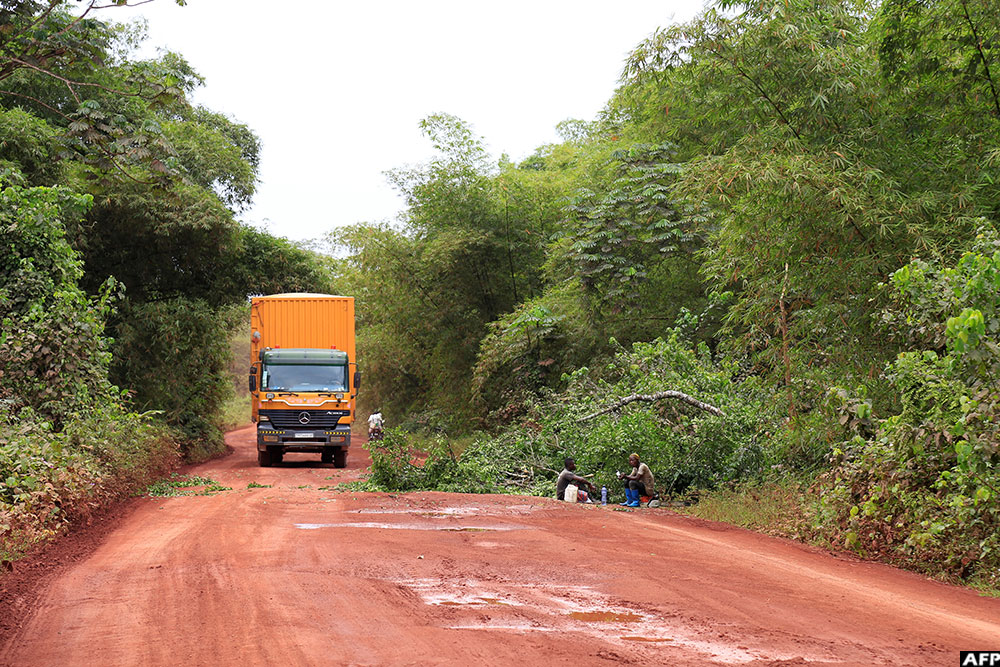
Q: Slashing methane emissions -- the second-largest contributor to climate change after carbon dioxide -- is considered one of the fastest ways to curb global warming. Is this possible?
A: Yes — and it is absolutely achievable with the right technologies. Methane is responsible for 30% of global warming, and reducing it delivers immediate climate impact.
Technologies like biogas systems, landfill gas capture, organic-waste anaerobic digestion, modern livestock-waste management, rice-field methane reduction, and pipeline leak detection are already proven, scalable, and commercially viable.
Our CleanBreeze Biogas Solutions initiative contributes directly to this goal by capturing methane from waste and converting it into renewable energy. For countries like the DRC that have large volumes of unmanaged organic waste, methane reduction is not only possible — it is one of the biggest climate opportunities.
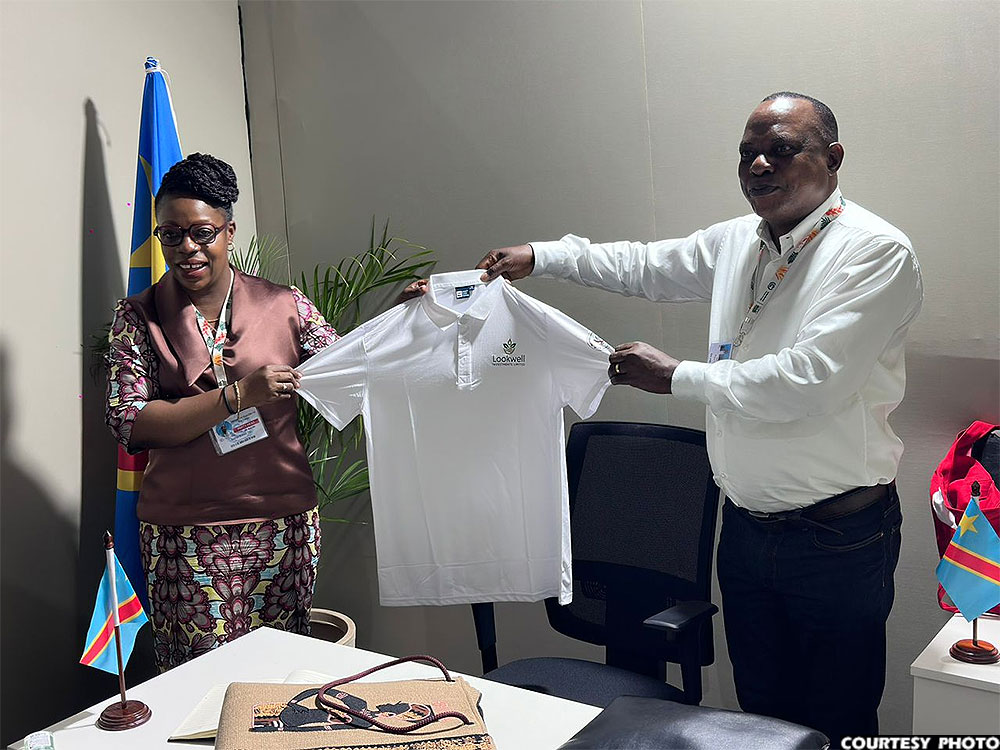
Lookwell Investments Ltd CEO Paul Mark Kayongo (R) presents a shirt bearing the company's logo to DR Congo’s Minister for Environment, Sustainable Development and New Climate Economics, Bahati Tito Arlette, on the sidelines of COP30
Q: The talks at the summit were closely watched by non-governmental organizations and several companies working in the climate sector. What are some of the takeaways from the summit for the participants?
A: Three main takeaways stand out for Lookwell:
a) The world is shifting toward circular-economy infrastructure. Waste-to-energy is moving from a niche idea to a global priority, especially for reducing methane. This validates our CleanBreeze strategy.
b) Climate finance is increasingly performance-based. The new funds and initiatives launched at COP30 reward measurable emissions reductions, such as avoided methane, increased renewable-energy output, improved waste-management metrics. Our project is naturally aligned with these measurable outcomes.
c) Africa’s climate opportunity is now. Many organizations emphasized the DRC’s role as a climate leader due to its forests, rivers, agricultural potential, and renewable-energy resources.
Lookwell is now better positioned to secure climate finance, form PPPs with government, partner with global climate funds, and expand CleanBreeze internationally.
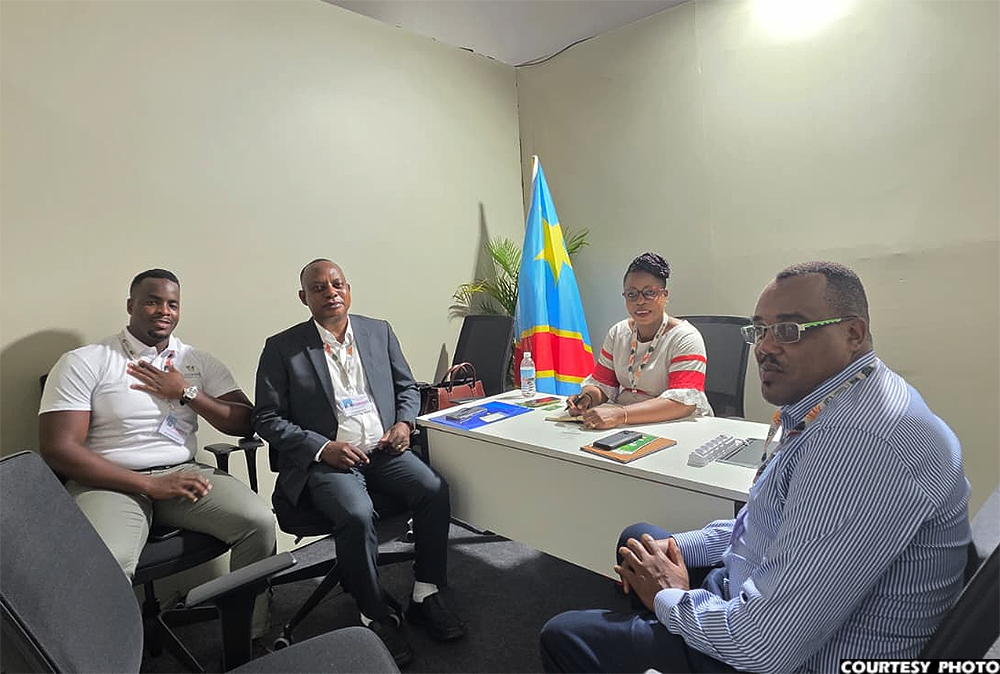
Lookwell Investments Ltd top leadership meets DR Congo’s Minister for Environment, Sustainable Development and New Climate Economics, Bahati Tito Arlette (2ndR), on the sidelines of COP30 in Belem
_______________________
PHONE VIDEO Watch Kayongo delivering his presentation in Belem 👇🏽